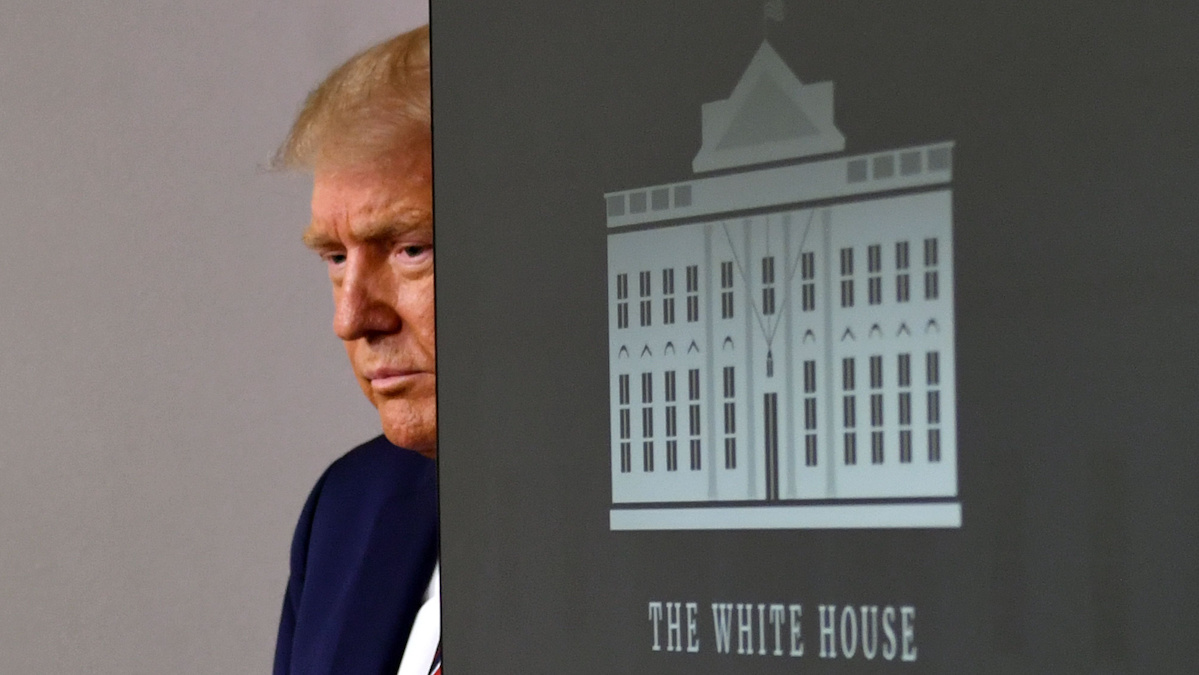

Trump arrives for a news conference in the Brady Briefing Room of the White House in Washington, DC, on Aug. 12, 2020. NICHOLAS KAMM / AFP via Getty Images
The Trump administration continued its war on appliance efficiency Wednesday with a proposal to increase the water that can flow from showerheads.
The latest Department of Energy (DOE) plan follows its rollbacks on lightbulb and dishwasher standards, as well as President Donald Trump‘s repeated complaints about water-saving appliances. But consumer advocates say the changes are unnecessary, and would harm both the environment and American pocketbooks.
“Frankly it’s silly,” Appliance Standards Awareness Project Executive Director Andrew deLaski told The Associated Press. “The country faces serious problems. We’ve got a pandemic, serious long-term drought throughout much of the West. We’ve got global climate change. Showerheads aren’t one of our problems.”
The rollback targets a 1992 law mandating that showerheads can’t release more than 2.5 gallons of water per minute. The law does not allow the DOE to set less rigorous standards, but the Trump administration has found a way around that, deLaski explained in a blog post:
The trick DOE is floating here is to try to dodge the law by reinterpreting what the word “showerhead” means.
The proposal, if finalized, would allow manufacturers to make giant showerheads with several nozzles within them. DOE proposes to accomplish this through a change in the test procedure that would characterize each of those separate nozzles as a showerhead. The full device could have as many 2.5 gallon-per-minute showerheads as the manufacturer wants. Get it?
The DOE proposal reverses an Obama-administration decision that the 2.5 gallon-per-minute rule should apply to the entire showerhead device, even if it had multiple nozzles, The Associated Press explained.
The proposed regulation follows Trump’s repeated complaints about efficient appliances. Most recently, he targeted showerheads specifically in a July 16 speech on the South Lawn of the White House.
“So showerheads — you take a shower, the water doesn’t come out. You want to wash your hands, the water doesn’t come out. So what do you do? You just stand there longer or you take a shower longer? Because my hair — I don’t know about you, but it has to be perfect. Perfect,” Trump said.
The remarks built on Trump’s repeated complaints about water-saving bathroom fixtures. Late last year, he claimed Americans had to flush toilets “10 times, 15 times,” CNN pointed out.
In justifying the change, Energy Department spokeswoman Shaylyn Hynes said it would allow “Americans — not Washington bureaucrats — to choose what kind of showerheads they have in their homes.”
But consumer advocates said U.S. customers could already take satisfying showers using devices that meet current standards.
“There is absolutely no need to change current showerhead standards,” Consumer Reports vice president of advocacy David Friedman said in a statement reported by CNN. “Thanks to the standards, consumers have access to showerheads that not only score well on CR tests and achieve high levels of customer satisfaction, but also save consumers money by reducing energy and water consumption.”
DeLaski told The Associated Press that the proposed devices would end up “literally probably washing you out of the bathroom.”
The proposed changes would also worsen the impacts and causes of the climate crisis, deLaski explained in his blog post.
He pointed to an April study, which found that much of the western U.S. is experiencing the first “megadrought” caused by global heating. And he noted that more water intensive showers would also mean more greenhouse gas emissions burned to heat that water.
“The new multi-nozzle showerheads would not only needlessly waste water, exacerbating shortages caused by drought, but also boost the carbon pollution that has made long-term droughts worse,” he wrote. “No one benefits from this gimmick.”
However, Reuters pointed out that the proposal may never come to anything. Trump faces reelection in November, and is currently behind in the polls. And if the regulation is finalized, it could be challenged in court.
- Trump Makes Strange Claim About Water Efficient Toilets: 'People ...
- New Report Details Dozens of Trump Rollbacks During Pandemic - EcoWatch

 233k
233k  41k
41k  Subscribe
Subscribe 